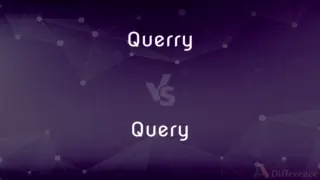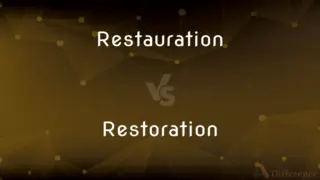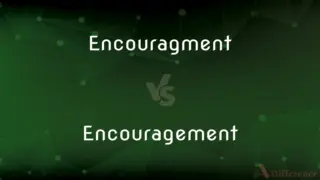Contined vs. Continued — Which is Correct Spelling?
By Tayyaba Rehman — Updated on March 25, 2024
"Contined" is an incorrect spelling. The correct spelling is "Continued", which means to persist in an action or state.
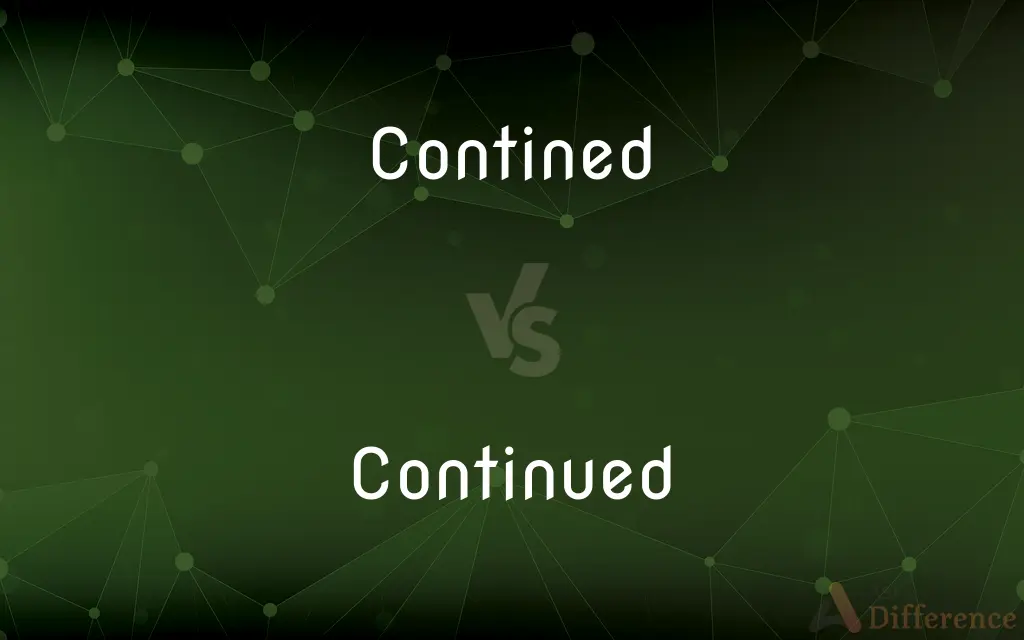
Table of Contents
Which is correct: Contined or Continued
How to spell Continued?

Contined
Incorrect Spelling

Continued
Correct Spelling
ADVERTISEMENT
Key Differences
Remember the "u" in "continue" is necessary to form "continued".
The word has two 'u's just like "pursued" or "included".
Associate "continued" with "ongoing"; both imply persistence.
"Contined" misses the 'u' like it’s missing continuation.
Think of the root word "continue" which is familiar.
ADVERTISEMENT
How Do You Spell Continued Correctly?
Incorrect: The movie was contined after a brief interruption.
Correct: The movie was continued after a brief interruption.
Incorrect: The construction was contined after the winter break.
Correct: The construction was continued after the winter break.
Incorrect: Her education was contined despite financial challenges.
Correct: Her education was continued despite financial challenges.
Incorrect: The meeting was contined to the next day due to time constraints.
Correct: The meeting was continued to the next day due to time constraints.
Incorrect: The story is contined in the next chapter of the book.
Correct: The story is continued in the next chapter of the book.
Continued Definitions
Extended over a period of time.
The continued rainfall led to flooding.
Carried on with a particular action.
He continued to insist on his innocence.
Persisted in the same state or action.
The lecture continued after a short break.
Resumed after an interruption.
The story is continued in the next chapter.
To go on with a particular action or in a particular condition; persist
We continued until the job was finished.
To exist over a period; last
The meeting continued for another hour.
To remain in the same state, capacity, or place
She continued as mayor for a second term.
To go on after an interruption; resume
The negotiations continued after a break for dinner.
To extend in a given direction
The stream continues for another five miles before it reaches the lake.
To carry on; persist in
The police will continue their investigation. I continued reading all afternoon.
To carry further in time, space, or development; extend
The builder will continue the road right through the swamp.
To cause to remain or last; retain or maintain
Are you continuing the prescription? The team continued its dominance over its opponents.
To carry on after an interruption; resume
After a break for lunch, we continued our hike.
(Law) To postpone or adjourn.
(dated) Prolonged; unstopped.
Uninterrupted.
Simple past tense and past participle of continue
The word continued when placed in the end of the page to show it is to be continued
Having extension of time, space, order of events, exertion of energy, etc.; extended; protracted; uninterrupted; also, resumed after interruption; extending through a succession of issues, session, etc.; as, a continued story.
Without stop or interruption;
To insure the continued success of the war
The continued existence of nationalism
The continued popularity of Westerns
Kept up without stopping or ceasing.
She continued her studies abroad.
Continued Meaning in a Sentence
The rain continued throughout the night, leaving puddles on the streets.
Despite the setbacks, the team continued with their project.
They continued their journey after a short rest.
The debate continued for hours, with no clear resolution.
He continued walking, unaware of the time.
The company continued to grow, expanding into new markets.
The research continued, yielding more fascinating results.
She continued to study hard, hoping to improve her grades.
The tradition has continued for generations in their family.
The discussions continued into the early morning.
The music continued playing even after the party ended.
She continued to support her friends through their difficult times.
The story continued to unfold, revealing unexpected twists.
The series continued to gain popularity with each new episode.
They continued their efforts to clean up the beach.
Her practice continued daily, improving her skills significantly.
The search continued for the missing hiker in the vast forest.
She continued her studies abroad, embracing new challenges.
Her kindness continued to make a difference in the community.
The game continued despite the rain, with players determined to finish.
The light continued to flicker, signaling a need for repair.
The laughter continued, filling the room with joy.
His love for reading continued to blossom as he got older.
The celebration continued late into the night, full of happiness and dance.
He continued to write letters, hoping for a reply.
Common Curiosities
Which vowel is used before Continued?
The vowel "u" is used before the "-ed" in "Continued".
Which conjunction is used with Continued?
No specific conjunction is uniquely associated with "Continued".
What is the verb form of Continued?
"Continued" itself is a verb form, specifically the past tense and past participle of "continue".
What is the pronunciation of Continued?
/kənˈtɪn.juːd/
What is the singular form of Continued?
"Continued" does not have a singular form as it is a verb or adjective, not a countable noun.
What is the plural form of Continued?
"Continued" does not have a plural form in the sense of nouns. It remains "continued" for all subjects as a verb.
Is Continued an adverb?
No, "Continued" is not an adverb.
Why is it called Continued?
It's called "Continued" as it refers to the act of persisting or prolonging a particular action or state.
What is the root word of Continued?
The root word is "continue".
Which preposition is used with Continued?
Common prepositions with "continued" include "on" (continued on) and "with" (continued with).
Which article is used with Continued?
Both "a" and "the" can be used depending on context: "a continued effort" or "the continued growth".
Is Continued a noun or adjective?
"Continued" can be an adjective (as in "continued success") or a verb.
Is Continued an abstract noun?
No, "Continued" is not an abstract noun.
Is the word Continued imperative?
No, "Continued" itself is not imperative.
Is Continued a vowel or consonant?
"Continued" is a word, not a single letter. It contains both vowels and consonants.
How many syllables are in Continued?
Three syllables.
What is another term for Continued?
Another term can be "persisted" or "prolonged".
What is the opposite of Continued?
The opposite is "ceased" or "stopped".
Which determiner is used with Continued?
Determiners like "this", "that", "a", or "the" can be used, depending on context.
What is the second form of Continued?
The second form is "continued".
What is the third form of Continued?
The third form is "continued".
Is Continued a negative or positive word?
"Continued" is neutral; its connotation depends on context.
What part of speech is Continued?
"Continued" can be both a verb and an adjective.
Is the Continued term a metaphor?
Not inherently, but it can be used metaphorically in some contexts.
How do we divide Continued into syllables?
Con-tin-ued
What is the first form of Continued?
The first form is "continue".
How is Continued used in a sentence?
"After a brief pause, the speaker continued with his presentation."
Is Continued a countable noun?
No, "Continued" is not a countable noun.
Is Continued a collective noun?
No, it's not a collective noun.
What is a stressed syllable in Continued?
The second syllable "tin" is stressed.
Share Your Discovery
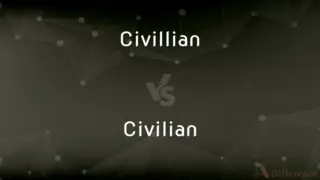
Previous Comparison
Civillian vs. Civilian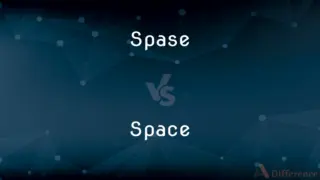
Next Comparison
Spase vs. SpaceAuthor Spotlight
Written by
Tayyaba RehmanTayyaba Rehman is a distinguished writer, currently serving as a primary contributor to askdifference.com. As a researcher in semantics and etymology, Tayyaba's passion for the complexity of languages and their distinctions has found a perfect home on the platform. Tayyaba delves into the intricacies of language, distinguishing between commonly confused words and phrases, thereby providing clarity for readers worldwide.


